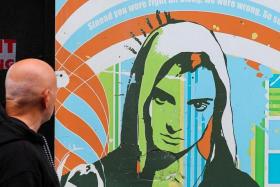Making hate popular in the Trump presidency
'White nationalism' has been around for a long time, and the US president has always been part of it
Shocked by the recent violence perpetrated by racist protesters in the United States, many Americans see the rise of "white nationalism" on the political landscape as a nasty surprise. In truth, it has been around for a long time.
Mr Steve Bannon, ousted strategist to US President Donald Trump, put it in context in his first interview since leaving the White House last month.
On last Sunday's episode of CBS' 60 Minutes, he said the US' neo-Nazis are simply "getting a free ride off Donald Trump".
In reality, Mr Trump and Mr Bannon are riding the winds of the nation's rising white supremacist movement.
In the month before he was appointed Mr Trump's campaign chief executive officer, Mr Bannon boasted that he had made Breitbart News - to which he has now returned - "the platform for the alt-right", a term popularised by white nationalist activist Richard B. Spencer to describe a loose coalition of far-right racist and white-separatist groups.
Breitbart News, ranked among the 50 most-viewed political websites before Mr Trump's inauguration, also unabashedly boosted Mr Trump's presidential candidacy with laudatory articles nestled among Islamophobic fables, false narratives about "black crime" and anti-feminist screeds.
Despite controversy surrounding Mr Trump's use of white supremacist social media postings during the campaign, he won the White House.
After provoking outrage by laying blame for the violence in Charlottesville on perpetrators "on many sides," Mr Trump later condemned neo-Nazis, white supremacists and the Ku Klux Klan, only to revert to blaming left-wing anti-fascist protesters later that week. White supremacists saw the wink.
"Thank you President Trump for your honesty & courage to tell the truth about #Charlottesville & condemn the leftist terrorists," tweeted former Ku Klux Klan leader David Duke, who had gone to Charlottesville that day, he said, to "fulfil the promises of Donald Trump".
First among those promises was one to build a wall on the southern border to keep out Latin American immigrants.
On Aug 29, Mr Trump pardoned Joe Arpaio, former sheriff of Maricopa County, Arizona, who was convicted of criminal contempt for refusing to stop racially profiling Latinos.
ASSAULT
More recently, Mr Trump rescinded the Deferred Action for Childhood Arrivals programme, which allowed undocumented immigrants brought to the US as children to avoid deportation. His Justice Department and advisory commission on election integrity have begun an assault on voting rights.
The signals were there from the start. On the day he announced his presidential candidacy, he called undocumented Mexican immigrants "rapists".
Throughout his campaign, he retweeted the posts of white supremacists, most famously one featuring a Star of David on a background of dollar bills and the image of Democratic presidential candidate Hillary Clinton that declared her to be corrupt. Another featured false statistics about "black crime".
He encouraged his rally audiences to roughly evict anti-racism protesters, who were often African-American. He revived the theme of "America First" favoured by Nazi sympathisers in the 1930s. And his misogyny is typically shared by the hate groups whose members so admire him.
The simmering resentment against the nation's first black president, who endorsed a woman to succeed him, gave Mr Trump an opportunity. He recognised the power that members of hate groups held through their social media networks.
To them, his promise to "make America great again" could be understood as a pledge to restore the old patriarchal racial and ethnic order.
So do not be shocked by the prevalence of hate groups now shaping American politics. Their demands were baked into the Trump agenda, and the president aims to deliver. - REUTERS
The writer is a columnist for The American Prospect.
Get The New Paper on your phone with the free TNP app. Download from the Apple App Store or Google Play Store now


